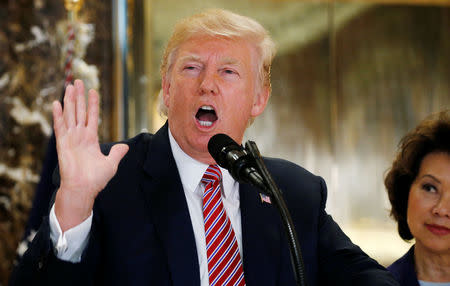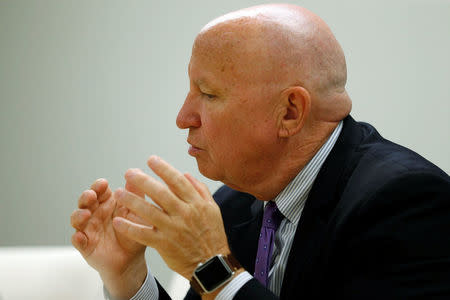Republicans offer few tax plan details at high-profile event
By Lisa Girion SANTA BARBARA, Calif. (Reuters) - Republican tax writers from the U.S. House of Representatives promoted their legislative goals at a special gathering in California on Wednesday, but offered few new details about provisions that may end up in their long-sought overhaul plan. As Wall Street analysts warned that President Donald Trump's controversial statements about Virginia protests on Saturday that turned deadly were hurting Republicans' prospects for progress on domestic policy, the lawmakers assembled in Santa Barbara to say their tax reform agenda is moving forward. Kevin Brady, chairman of the tax-writing U.S. House of Representatives Ways and Means Committee, spoke in broad brushstrokes about the effort at Rancho del Cielo, the country home of former President Ronald Reagan, a Republican who oversaw the last major tax code overhaul in 1986. "If you look at today's tax code you can't even recognize the principles that made the Reagan reforms such a triumph for the American people," Brady said. Asked whether the plan would have specific provisions, Brady said: "We're working through the details of the overall tax plan with the White House, President Trump, and Senate tax writers as well." "We have more work to do. I anticipate continuing to work through August with the White House and Senate, bring forward a tax reform plan at the Ways and Means Committee after we return," Brady said, adding he wanted to get legislation to Trump before the end of the year. Brady was joined by Representatives Peter Roskam, David Schweikert and Carlos Curbelo, all Republican committee members. Market expectations for tax reform have declined in recent weeks, analysts said, and dimmed further after Trump's Tuesday press conference, where he said both sides were to blame for a deadly rally in Charlottesville, Virginia, between neo-Nazis, white supremacists and counter-protestors. Before the event, Curbelo, the son of Cuban exiles who emigrated to the United States, told reporters that Trump's remarks marked "the lowest point yet" in his presidency. "In a way we've become accustomed to working in a very distracting environment. That's not new. Now this is on a whole different scale," he said. "While you have all of these other headlines, the public isn't going to be paying very much attention to the legislative agenda." Still searching for his first major legislative achievement after 208 days in office, Trump has refocused on overhauling the tax code, but he has been constantly distracted by controversies involving North Korea, race relations and investigations of possible ties between his 2016 campaign and Moscow. Trump was forced to disband two high-profile business advisory councils on Wednesday after corporate CEOs quit the committees in protest over his remarks about the violence in Charlottesville. Brady has remained bullish on the chances for a tax overhaul even after a Republican push to dismantle Obamacare collapsed in July. At Wednesday's event he told reporters the differences between a healthcare and tax overhaul are "just about everything." As they did with Obamacare, the party has launched a nationwide publicity campaign for tax reform without first hammering out the final details of their proposal. The 1986 tax overhaul under Reagan was the result of a multi-year, bipartisan negotiation. Republicans are seeking to do key portions of tax reform within months, without Democratic support. Republicans have not yet introduced tax legislation and party leaders have already discarded key pieces of their initial, ambitious plan. No revenue-raising provisions have been agreed upon to replace those that were discarded. Corporate lobbyists and independent experts have said Congress and Trump are far apart on critical issues, such as how to slash rates without ballooning the federal deficit. Brady downplayed those differences on Wednesday, saying they planned to unify behind "one bold plan." (Additional reporting by Amanda Becker and David Morgan in Washington; Writing by Amanda Becker; Editing by Kevin Drawbaugh and Richard Chang)


